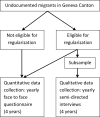Impact of legal status change on undocumented migrants' health and well-being (Parchemins): protocol of a 4-year, prospective, mixed-methods study
- PMID: 31154311
- PMCID: PMC6549650
- DOI: 10.1136/bmjopen-2018-028336
Impact of legal status change on undocumented migrants' health and well-being (Parchemins): protocol of a 4-year, prospective, mixed-methods study
Abstract
Introduction: Migrants without residency permit, known as undocumented, tend to live in precarious conditions and be exposed to an accumulation of adverse determinants of health. Only scarce evidence exists on the social, economic and living conditions-related factors influencing their health status and well-being. No study has assessed the impact of legal status regularisation. The Parchemins study is the first prospective, mixed-methods study aiming at measuring the impact on health and well-being of a regularisation policy on undocumented migrants in Europe.
Methods and analysis: The Parchemins study will compare self-rated health and satisfaction with life in a group of adult undocumented migrants who qualify for applying for a residency permit (intervention group) with a group of undocumented migrants who lack one or more eligibility criteria for regularisation (control group) in Geneva Canton, Switzerland. Asylum seekers are not included in this study. The total sample will include 400 participants. Data collection will consist of standardised questionnaires complemented by semidirected interviews in a subsample (n=38) of migrants qualifying for regularisation. The baseline data will be collected just before or during the regularisation, and participants will subsequently be followed up yearly for 3 years. The quantitative part will explore variables about health (ie, health status, occupational health, health-seeking behaviours, access to care, healthcare utilisation), well-being (measured by satisfaction with different dimensions of life), living conditions (ie, employment, accommodation, social support) and economic situation (income, expenditures). Several confounders including sociodemographic characteristics and migration history will be collected. The qualitative part will explore longitudinally the experience of change in legal status at individual and family levels.
Ethics and dissemination: This study was approved by the Ethics Committee of Geneva, Switzerland. All participants provided informed consent. Results will be shared with undocumented migrants and disseminated in scientific journals and conferences. Fully anonymised data will be available to researchers.
Keywords: health; migration; public health; regularization; undocumented migrant; wellbeing.
© Author(s) (or their employer(s)) 2019. Re-use permitted under CC BY-NC. No commercial re-use. See rights and permissions. Published by BMJ.
Conflict of interest statement
Competing interests: None declared.
References
-
- International Organization for Migration. World migration report 2018. Geneva: IOM, 2017.
-
- Kraler A, Rogoz M. Irregular migration in the European Union since the turn of the millennium –development, economic background and discussion. Database on Irregular Migration, Working paper 11/2011. Vienna: International Centre for Migration Policy Development (ICMPD), 2011.
-
- International Organization for Migration. World Migration Report 2010. Geneva: IOM, 2010.
-
- Pew Hispanic Centre. A Nation of Immigrants. A Portrait of the 40 Million, Including 11 Million Unauthorized. Washington: Pew Research Centre, 2013.
-
- Morlok M, Oswald A, Meier H, et al. . Les sans-papiers en Suisse en 2015. Bâle: BSS, 2016.
Publication types
MeSH terms
LinkOut - more resources
Full Text Sources

